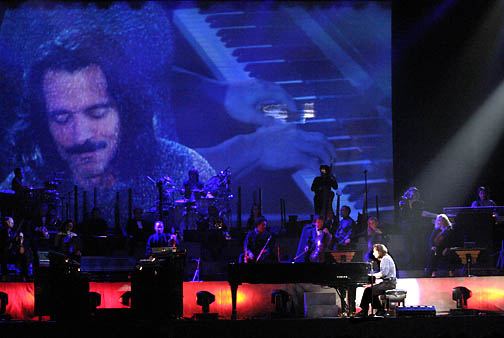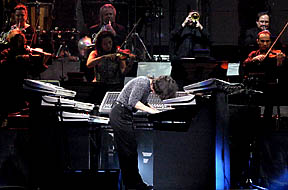


Story by Matt Richter
Shuffling to the Bradley Center's glass entry, my thin black socks offer up no protection for my even thinner ankles from the merciless Lake Michigan mid-winter winds-an icy breeze cuts through the slacks and wool pea coat I don, my "office professional" get-up I didn't have time to shed before the show. For previous concert reviews, I would have felt out of place shouldering a formal-casual look; tonight, however, I blend well with a crowd of silk and leather-clad middle-aged Yanni fans, all sharing the shadow of a youthful exuberance beneath blushed and after-shaved graying faces. From late 30's to early 60's, the elegant-but-eager crowd, some toting children, others Gucci handbags, produces a subdued roar, whispering to each other about particular musicians they are anxiously anticipating most. Still wondering what exactly a "Yanni" is, hoping this Greek mythological creature doesn't put me to sleep or force tired, mediocre piano melodies down my throat, I ponder the cliched labels Milwaukeeans shared with me when I asked who or what is a "Yanni": chick music, overtly dramatic, a waste of time, a snow monster living in the Himalayan Mountains.
Photos by Matt SchwenkeA "Yanni," I am soon to learn, isn't a sedative or a heterosexually-threatening, drawn-out piano ballad, nor is he a snow monster (it's yeti, not Yanni). He is a small Greek man, all smiles and pseudo-wind-swept black hair, a native of a small Greek village, an alumnus of the University of Minnesota, and one of the most internationally revered composers/musicians today. A champion swimmer and self-taught pianist, in his childhood, Yanni shared his family's love of music, eventually following this passion, still not able to read a note. His chart-topping career began in 1992 with his first Grammy-nominated album Dare to Dream; since, his "one people, one world" approach to composing and playing ethnically and culturally diverse, mostly lyric-less music has taken him to multi-million-strong crowds and shows at the Taj Mahal, China's Forbidden City, and to his homeland at the Parthenon, which spurned the #2 best-selling music video of all time and a PBS fundraiser special smashing previous pledge-drive records. Touring now across the U.S. for his 2003 release, Ethnicity, his third Virgin Records and thirteenth album release, Yanni takes stage with a flirtatious skip as the curtains rise; I heave a pessimistic sigh, mustering patience for, I assume, an uncomfortable two hours.
Memorable shows, for me at least, aren't by my favorite artists; I thrive on the surprise-the "shock and awe"-of underestimated performances. Which leaves me in kind of a baklava (I don't know the Greek word for pickle). Yanni puts on a damn good show, and since my expectations couldn't have been lower, I am forced, to my yet-to-wane surprise, to rate this concert as one of the better I've attended in recent years.The tiered stage, washed in soft blue light, reveals itself to a still-quiet crowd; Yanni's keyboard cubicle, dead-center, shrinks as my eyes take in the rest of the view. No less than 26 musicians surround the stacked keyboards marking Yanni's position, which suddenly becomes clear: the composer, the conductor. As the first song, a track from Live at the Acropolis, begins with a powerful drum lead-in by Charlie Adams, world-renowned drummer and teacher to a handful of rock's most notable artists including Smashing Pumpkin's Jimmy Chamberlin, the reason for this troupe's international fame crashes over the audience, myself included; instrumentation, from around the globe, at its finest.
As the un-breaking set unfolds, song by song, the multicultural symphony surrenders a violinist, a flutist, another percussionist, and other members, one by one, to the spotlight, wielding recognizable symphonic mainstays and mysterious, centuries-old instruments; they bolt upright to a standing position and belt out masterful solos, egged on by encouraging smiles and flamboyant gesturing from the maestro. A towering Australian man charges on stage, brandishing a seven-foot didgeridoo, captivating the audience with its surreal sound. A Peruvian flutist pulls out a Chinese flute, seemingly an extension of his own physical presence, for "Nightingale," a track written for the concert at the Forbidden City (for the previous track, he played a 3,000-year-old Armenian flute just as well). The following song features dueling violins exuding an energy permeating every corner of the arena. A cellist pulls and pushes his bow, producing a melancholy tirade of pulsing notes. Latin trumpet players layer jazz-infused bars over the sound of relentless conga drums, and a Paraguayan man with curly black hair tosses (yes, tosses) one of three harps onto his shoulder to prod the strings in Zeppelin-esque fashion. And for anyone believing "Yanni" is Greek for "ego," a mid-set song saw the composer take a back seat to another keyboardists' solo. The highlight: a stage-hand brings a drum set down to stage left, and Mr. Adams unleashes a flurry of changes, rolls and poly-rhythms, bringing the crowd to its feet.
Although the flowing hair and form-fitting gray sweater he wore may trip the gag reflex of 20-somethings terrified of anything that doesn't scream hetero with a thumping bass and bling-bling in the lights, Yanni demonstrates that world-class instrumentation is equally as universal as the language of math, and his work, flogged by stereotypes but appreciated globally, is hard not to appreciate.

Here's Your Chance to.... Respond!
Your feedback will be featured on
Rant or Rave within 24 hours.